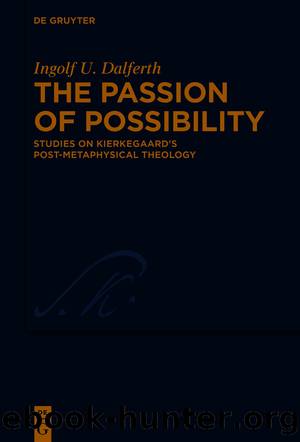The Passion of Possibility by Ingolf U. Dalferth

Author:Ingolf U. Dalferth
Language: eng
Format: epub
Publisher: De Gruyter
Published: 2023-02-20T21:57:33.269000+00:00
1.2
What is it to be a Christian?
Becoming a Christian, according to the Postscript, is not a cognitive or intellectual affair. You do not become a Christian by knowing what Christianity is. Not only because âone can know what Christianity is without being a Christianâ but also because one can become a Christian without knowing beforehand what Christianity is.8 You may know as much as you like about Christianity, you can be as certain as you may about its truth, it does not make you a Christian.
To be or not to be a Christian, therefore, does not depend on any sort of knowledge, neither on the objective knowledge of the tenets of Christianity nor on the subjective certainty of their truth. No belief that Christianity is true, however certain, actually shows it to be true or is to be confused with faith. Just as â[f]aith does not result from straightforward scholarly deliberation, nor does it come directly,â so faith has âa beneficial taskmaster in uncertainty,â but âits worst enemy in [â¦] certainty.â9 I am not a Christian because I am certain that Christianity is true, rather I am certain that it is true because I am a Christian. Similarly, no descriptive third-person-knowledge, however detailed and comprehensive, ever results in existential first-person-knowledge. One âcan know what Christianity is without being a Christian.â10 âI know everything about Christianityâ does not entail âI am a Christian.â It not even entails that I know âwhat it is to be a Christian.â11 According to the Postscript, one cannot âknow what it is to be a Christian without being one [â¦] On the other hand, the Christian must indeed also know what Christianity is and be able to tell usâprovided he himself has become one.â12 So, the situation presented in the Postscript is somewhat complicated. The most important aspects can be summarized in six points:
First, anyone who is able to know at all can know about Christianity: Christianity is not an inscrutable mystery but a possible object of knowledge, that is, of philosophical insight (necessary truth) and empirical or historical study (contingent truths).
Second, to know about Christianity does not make you a Christian: Knowledge, even in the strong sense in which âI know pâ entails âp is true,â is neither sufficient nor necessary for a Christian to be a Christian. I do not become a Christian by knowing about Christianity: âI know about Christianityâ does not entail âI am a Christian;â and I do not have to know about Christianity to become a Christian: âI am not a Christian because (of what) I know about Christianity.â It is one thing to know about Christianity, another to be a Christian.
Third, to know about Christianity is not to know what it is to be a Christian: There is not only a difference between third-person knowledge (âX knows about Christianityâ) and first-person knowledge (âI know about Christianityâ) but also between descriptive knowledge (âI know about Christianityâ) and existential knowledge (âI know that I am a Christianâ or âI know myself to be a Christianâ).
Download
This site does not store any files on its server. We only index and link to content provided by other sites. Please contact the content providers to delete copyright contents if any and email us, we'll remove relevant links or contents immediately.
Spell It Out by David Crystal(35342)
Life for Me Ain't Been No Crystal Stair by Susan Sheehan(35148)
Cecilia; Or, Memoirs of an Heiress — Volume 1 by Fanny Burney(31322)
Cecilia; Or, Memoirs of an Heiress — Volume 3 by Fanny Burney(30928)
Cecilia; Or, Memoirs of an Heiress — Volume 2 by Fanny Burney(30885)
Professional Troublemaker by Luvvie Ajayi Jones(28960)
The Great Music City by Andrea Baker(21195)
We're Going to Need More Wine by Gabrielle Union(18064)
Twilight of the Idols With the Antichrist and Ecce Homo by Friedrich Nietzsche(17702)
The Secret History by Donna Tartt(16608)
Cat's cradle by Kurt Vonnegut(13855)
Bombshells: Glamour Girls of a Lifetime by Sullivan Steve(13100)
Pimp by Iceberg Slim(12922)
All the Missing Girls by Megan Miranda(12739)
Fifty Shades Freed by E L James(12443)
Norse Mythology by Gaiman Neil(11873)
Talking to Strangers by Malcolm Gladwell(11861)
The Social Justice Warrior Handbook by Lisa De Pasquale(11485)
Underground: A Human History of the Worlds Beneath Our Feet by Will Hunt(11251)
